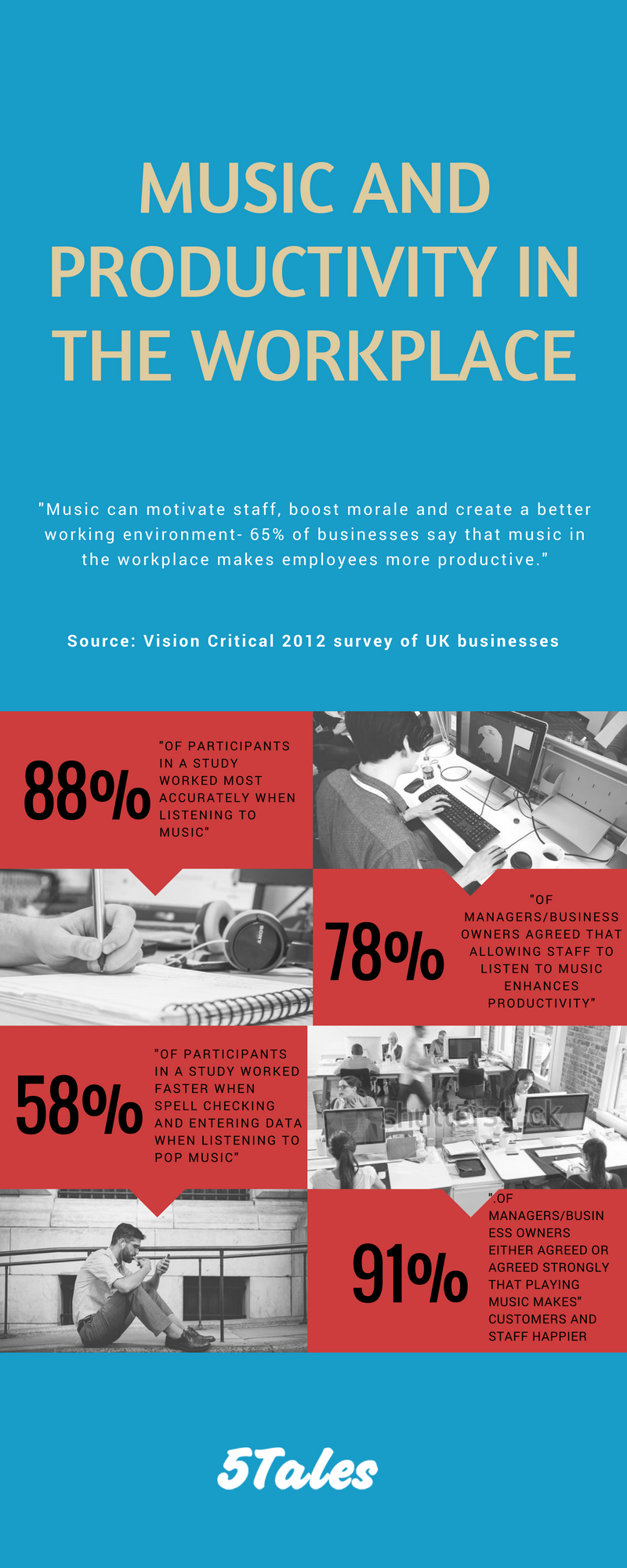It’s no doubt that music makes everything better. Whether it’s that new trap beat spurring you on to a personal best in the gym or romancing your significant other with some sensual Marvin Gaye.
Or when you’re making that 7:30 am drive into work all the more bearable with some anthems from Freddy Mercury; in the background or the forefront, music just seems to make things easier. Bearable at the least.
But what about in the workplace?
We’re in 2017 and most workplace activities nowadays are done from behind the computer and, for many, music has become synonymous with our day to day activities in the fight to boost creativity, power through tasks or even just to stave boredom.
So the real question should be what effect does music have on the workplace?
Take a look at research findings from Music works for you, which discovered that music would not only boost workplace satisfaction but improve employee productivity:

So, just how does music improve work productivity?
Music Kills Boredom
This should be no surprise. Since the dawn of time - before stereos, radios and headphones- men, women and children have used music in the form of hymns and the like to make the boring day to day tasks more enjoyable.
And even in our era, research has discovered that music can actually boost productivity when you’re working:
“A series of experiments has investigated the relationship between the playing of background music during the performance of repetitive work and efficiency in performing such a task. The results give strong support to the contention that economic benefits can accrue from the use of music in industry.”
Other researchers would also argue that it was not the music itself, but that it actually boosts our moods, which then results in greater work productivity.
[cta id=”2091″ vid=”0″]
Music Can Be Your Escape
From your office joker to the natural office ambiance, listening to music is a tool employees can best use to escape a noisy workplace:
“Dr. Lesiuk’s research focuses on how music affects workplace performance. In one study involving information technology specialists, she found that those who listened to music completed their tasks more quickly and came up with better ideas than those who didn’t, because the music improved their mood.”
Working in an open office can make working with headphones a necessity. Though open space can motivate employees to work together and collaborate, the collective noise easily has the potential of dividing attention and causing distraction. If there is no physical escape—such as a private room—then a pair of headphones may be the best alternative.
There’s No Better Ambiance Than Music
When you really need to get your creative juices flowing, researchers found that ambient music/noise when played at a moderate level can induce processing dis fluency-which is scientific jargon for making the brain work harder-which in turn enhances creativity.
“Finally, this research also contributes theoretically to the literature on creativity and innovation adoption. We document that ambient noise, an incidental environmental cue, is an important antecedent of creative cognition. A moderate level of noise not only enhances creative production but also leads to greater adoption of innovative products.”
The key word here, moderate. Heavy basses and wacky synths played at full volume are better served on the Friday afternoon drive home, not when you’ve got work to get done.
Choosing The Music For You
Familiarity Is Key
Now, when it comes to the type of music that should be used; the more familiar the better. Listening to a Kanye album for the first time just won’t fly in the workplace. You are guaranteed to quote him both at home and in the office for the rest of your existence.
Using music you’re already familiar with ensures you’re not easily distracted by the lyrics or the actual instrumentation. Imagine listening to bohemian rhapsody for the first time while completing any task whatsoever; the rift changes alone will leave you in wonderland.
Nature Sounds
If music is too full on, then you can always try the sounds of nature.
Sounds of nature can mask intelligible speech just as well as white noise while also enhancing cognitive functioning, optimizing the ability to concentrate, and increasing overall worker satisfaction.
Try mountain streams, rainfall, or dolphins if that’s what floats your boat.
Songs You Couldn’t Care Less About
Studies from a Taiwan university tested how listener’s fondness for music affected their concentration. They found when workers strongly liked or disliked the music they heard in the background they became more distracted by it.
So maybe you just need to listen to that artist your mate has recommended for months, but you know their music taste is borderline average. If it doesn’t peak your interest, then you can at least thank them for helping you get work done.
Instrumentals
When it comes to low immersive work, music with lyrics can obviously offer a great benefit. But for intense work, the lyrics can just get in the way.
Speech, according to a Cambridge study, distracts about 48% of office workers.
It has to do with how intelligible the words are that forces us to shift focus from our work to figuring out what someone is saying. So when you’re using music to work, instead of actually working you find yourself doing things like clarifying every misheard lyric.
So if you think you’re in that 48% using music to block out conversations in the office, try using instrumentals or music with minimal lyrics — your focus would simply shift from the conversation to the words in a song.
Everyone has their own way of being productive, whether it’s with or without music. If you want music to focus or simply to stave the boredom, choose the sounds you use carefully: try out all sorts of music, play around with the volume, or bask in the sounds of nature. Until you press play, you never know what might help you smash through a day’s work.
[cta id=”2091″ vid=”0″]